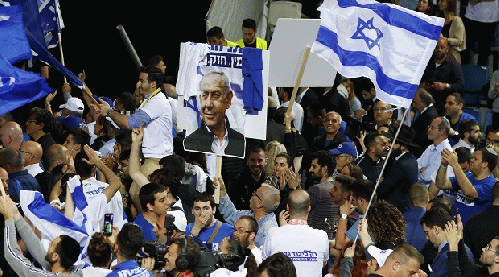
Netanyahu is expected to be charged with fraud and breach of trust in the immediate wake of next month's election
(Image by Jewish Telegraphic Agencyu) Details DMCA
The real fight in Israel's re-run election next month is not between the right wing and a so-called "centre-left" but between two rival camps within the nationalist right, according to analysts.
The outcome may prove a moment of truth for the shrinking secular right as it comes up once again against an ever-more powerful camp that fuses religion with ultra-nationalism.
Will the secular right emerge with enough political weight to act as a power-broker in the post-election negotiations, or can the religious right form a government without any support from the secular parties? That is what the election will determine.
An earlier election in April, which failed to produce a decisive result between these two camps, nonetheless confirmed the right's absolute dominance. The Zionist centre-left parties, including the founding Labor party, were routed, securing between them just 10 seats in the 120-member parliament.
Netanyahu, the interim prime minister, was forced to stage new elections, on 17 September, after April's ballot left him unable to rope together secular and religious parties on the right.
To secure a majority in parliament, he needed to include the five seats of the anti-religious Yisrael Beiteinu party, led by Avigdor Lieberman.
Lieberman eventually pulled out of coalition talks, saying he was not prepared to sit in a government with two parties effectively run by the ultra-Orthodox rabbinate. This time, he has indicated he won't sit with any of the religious parties.
Vehicle for protestMuch of the rest of the secular right has deserted Netanyahu's Likud party. At the last election, they mostly found a political home in the new Blue and White party, led by a former military chief of staff, Benny Gantz.
Polls suggest Lieberman may also attract a larger share of these voters after his recent stand-off with Netanyahu. He has demanded an exclusively secular right-wing government, comprising Likud, Blue and White, and his own Yisrael Beiteinu party.
Blue and White has presented itself chiefly as a vehicle for protest against Netanyahu. They oppose a decade of governments in which he has allowed the religious right to play an increasingly assertive role, and the ever-deepening corruption scandals he has been embroiled in. Netanyahu is expected to be charged with fraud and breach of trust in the immediate wake of next month's election.
Blue and White has been misleadingly labelled as centrist by some observers. But it tied with Netanyahu's Likud, at 35 seats each, in April by appealing to a largely secular strain of right-wing nationalism that three decades ago was the domain of the Likud party.
Now Netanyahu and the religious right hope to work in tandem to secure between them a narrow majority of seats to form a government without relying on the secular right-wing parties of either Lieberman or Gantz.
A more polarised IsraelYossi Gurvitz, an Israeli journalist and researcher on religious extremism, said the rise of the religious right was an indication of wider shifts in Israeli society.
"Israel is getting more religious, and its religious parties are getting more extreme, while much of what's left of Israeli society is becoming more militantly secular in response," he told Middle East Eye. "Israel is polarising, and each is side is increasingly intolerant of the other."
The secular camp, however, has been playing a less significant role with each passing government.
Next Page 1 | 2 | 3 | 4 | 5 | 6
(Note: You can view every article as one long page if you sign up as an Advocate Member, or higher).





